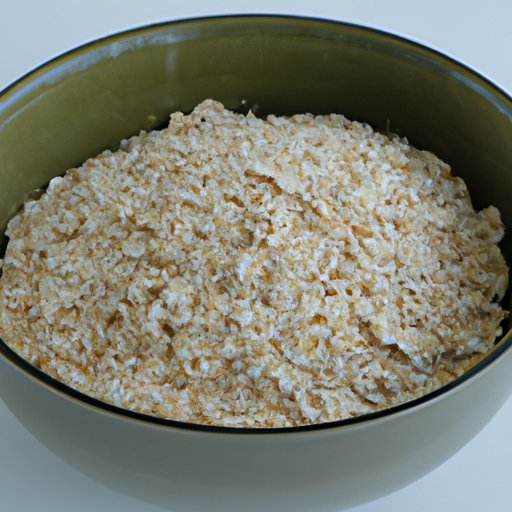Introduction
Have you ever wondered what would happen if you ate oatmeal every day? Oatmeal is a popular breakfast food that has been around for centuries. It is known for its high fiber content, but there are many other benefits and downsides to consider when making it a daily part of your diet. In this article, we will explore the benefits and downsides of eating oatmeal every day, as well as how to make it more interesting and incorporate it into your daily diet.
Benefits of Eating Oatmeal Every Day
One of the main benefits of eating oatmeal every day is that it can lower your cholesterol levels and reduce the risk of heart disease. This is because oatmeal contains a type of soluble fiber called beta-glucan, which helps to reduce the amount of cholesterol that is absorbed into the bloodstream. Additionally, oatmeal is a rich source of nutrients such as magnesium, potassium, and phosphorus, as well as antioxidants that can help to reduce inflammation in the body.
Another benefit of eating oatmeal every day is that it promotes healthy digestion. The fiber in oatmeal can help to regulate bowel movements and prevent constipation. It can also help to reduce inflammation in the gut and promote the growth of healthy gut bacteria.
Downsides of Eating Oatmeal Every Day
While there are many benefits to eating oatmeal every day, there are also some downsides to consider. One potential downside is that oatmeal is high in carbohydrates and may not be suitable for low-carb diets. If you are following a low-carb diet, you may need to limit your intake of oatmeal or choose a low-carb alternative.
Another potential downside of eating oatmeal every day is that some people may have food allergies or intolerances to oats. If you experience symptoms such as bloating, gas, or diarrhea after eating oatmeal, it may be a sign that you are intolerant or allergic to oats.
Finally, it is important to note that some people may experience bloating or digestive discomfort after eating oatmeal. This is because oatmeal contains a type of fiber called insoluble fiber, which can be difficult to digest for some people. If you experience these symptoms after eating oatmeal, you may need to reduce your intake or try different cooking methods to make it more digestible.
How to Make Your Oatmeal More Interesting With Toppings and Mix-ins
If you find that plain oatmeal is boring, there are many ways to make it more interesting and flavorful. One option is to add toppings and mix-ins to your bowl of oatmeal. Some sweet toppings that you might consider include fresh fruit, honey, cinnamon, and maple syrup. For a savory twist, you might try adding chopped herbs, grated cheese, or bacon bits.

Oatmeal as a Breakfast Food for Runners
Oatmeal is a popular breakfast food for athletes and runners because it provides sustained energy and is easy to digest. In addition to its fiber and nutrient content, oatmeal is also a good source of carbohydrates, which are essential for fueling physical activity. For runners, it is recommended to eat a bowl of oatmeal 2-3 hours before a race or workout to allow for proper digestion.
How to Cook Oatmeal Instantly and Effectively
There are several methods for cooking oatmeal, including on the stove, in the microwave, or in a slow cooker. To cook oatmeal on the stove, you will typically need to combine oats with water or milk and cook on low heat for several minutes, stirring occasionally. For a quicker option, you can also cook oatmeal in the microwave by combining oats with water or milk and cooking for 1-2 minutes, stirring occasionally. To cook oatmeal in a slow cooker, combine oats with water or milk and cook on low heat for several hours.
The Best Time of Day to Eat a Bowl of Oatmeal
The best time of day to eat a bowl of oatmeal is typically in the morning. This is because oatmeal can provide sustained energy and help to regulate blood sugar levels throughout the day. However, some people may find that eating oatmeal at night can help to promote sleep. It is important to listen to your body and determine what works best for you.
Quick and Easy Ways to Incorporate Oatmeal into Your Daily Diet
If you want to incorporate oatmeal into your daily diet, there are many easy ways to do so. One option is to use oatmeal as a base for smoothies or yogurt bowls. You can also add oats to baked goods such as muffins and breads, or use them as a coating for chicken or fish. Another option is to use oatmeal as a substitute for bread crumbs in recipes such as meatballs or stuffed mushrooms.
Conclusion
Oatmeal is a popular breakfast food that has many benefits and downsides to consider. While it can lower cholesterol and promote healthy digestion, it may not be suitable for low-carb diets and may cause digestive discomfort for some people. However, by adding toppings and mix-ins, incorporating it into your daily diet, and cooking it effectively, you can make oatmeal a tasty and nutritious part of your everyday routine.
